Indian workers toil at one of world's highest roads
Stationed at a height of 5,360m , the 13 men, from Jharkhand, have little experience of cold climes of Chang La
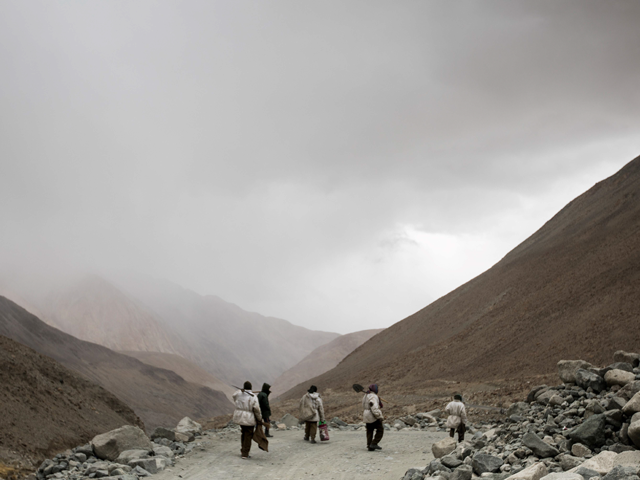
Hundreds of miles from their homes, a group of labourers are toiling in a cold Indian Himalayan desert to repair some of the world's highest roads.
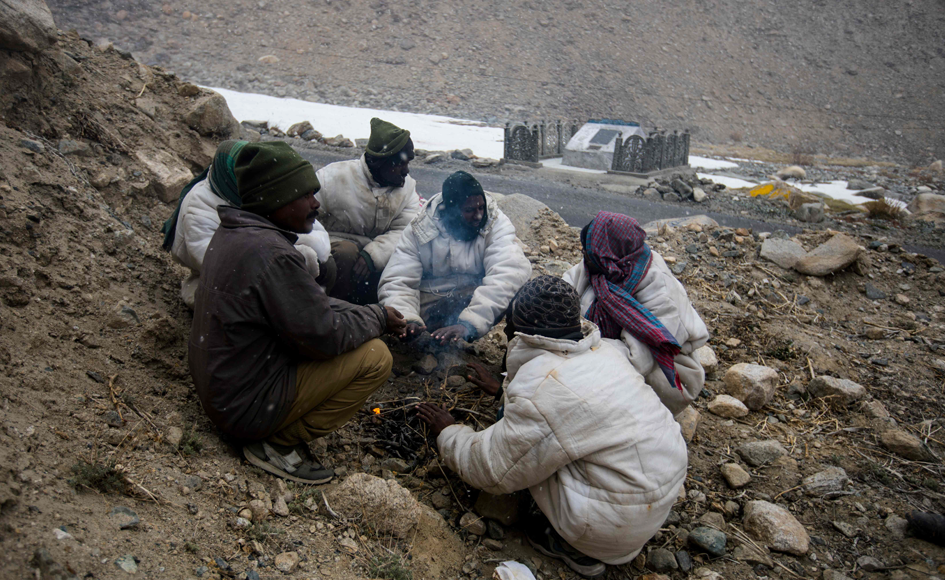 Road maintenance workers from India's low-lying eastern Jharkhand state warm up around a bonfire during a inclement weather while working along Pangong Lake road near the Chang La pass in northern India's Ladakh region of Jammu and Kashmir state. Photo: AFP
Road maintenance workers from India's low-lying eastern Jharkhand state warm up around a bonfire during a inclement weather while working along Pangong Lake road near the Chang La pass in northern India's Ladakh region of Jammu and Kashmir state. Photo: AFP
Stationed near Chang La pass which is perched at a height of 5,360 metres (17,590 feet), the 13 men, whose home is the low-lying eastern state of Jharkhand, have little experience of cold climes.
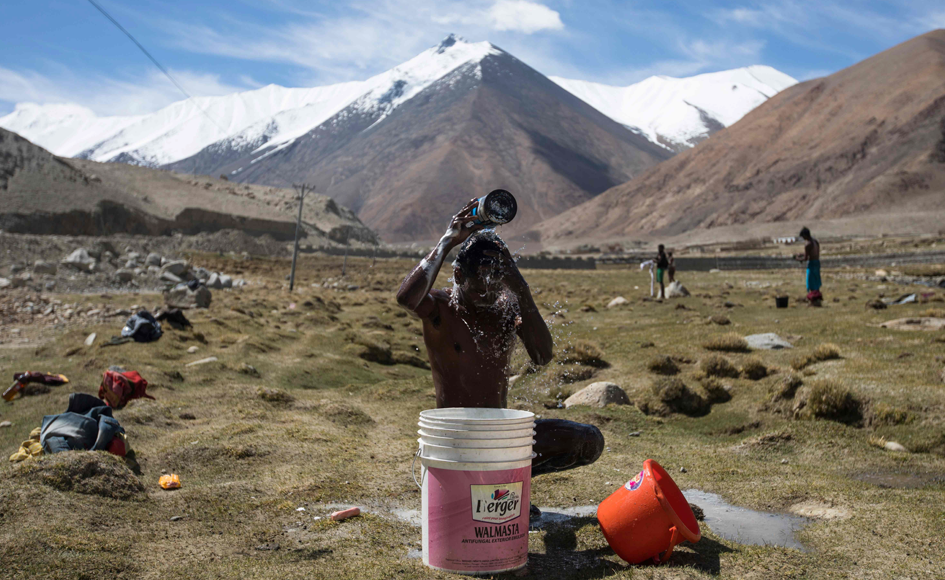 Chota Montu, 25, a road maintenance worker from India's low-lying eastern Jharkhand state, takes a bath on his day off at his campsite. Photo: AFP
Chota Montu, 25, a road maintenance worker from India's low-lying eastern Jharkhand state, takes a bath on his day off at his campsite. Photo: AFP
They have been hired for four months in the Tangtse district of Ladakh, where blizzards can rage throughout the year, to ensure that the key tourist route to the picturesque Nubra Valley and Pangong lake is in good condition.
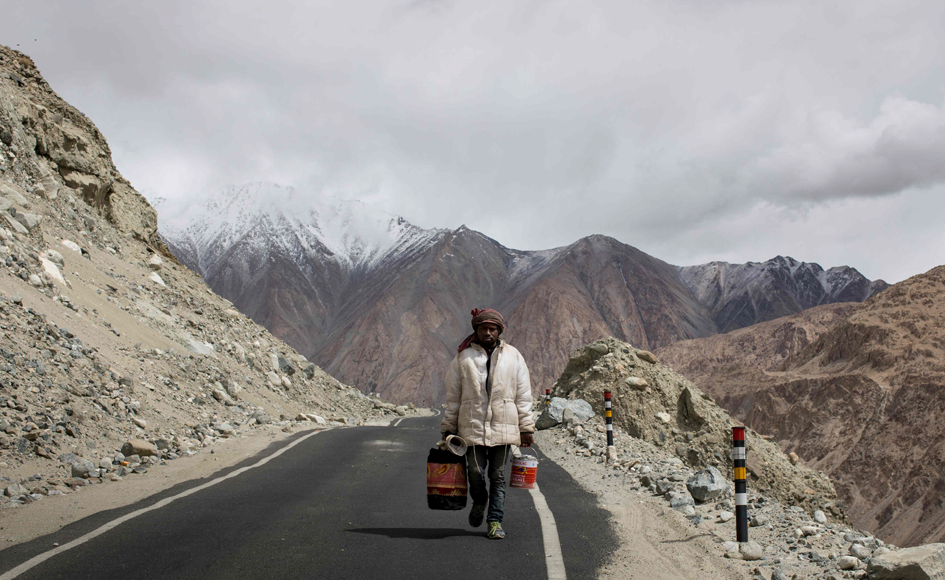 Stationed near Chang La pass which is perched at a height of 5,360 metres (17,590 feet), the 13 men, whose home is the low-lying eastern state of Jharkhand, have little experience of cold climes. Photo: AFP
Stationed near Chang La pass which is perched at a height of 5,360 metres (17,590 feet), the 13 men, whose home is the low-lying eastern state of Jharkhand, have little experience of cold climes. Photo: AFP
Their back-breaking stint will fetch them 40,000 rupees ($572) each -- a considerable sum in a country where more than 21 percent of the 1.3 billion population lived on less than two dollars a day in 2011.
"There is not much work there (back home). I don't find any work difficult," said Sunil Tutu, 30.
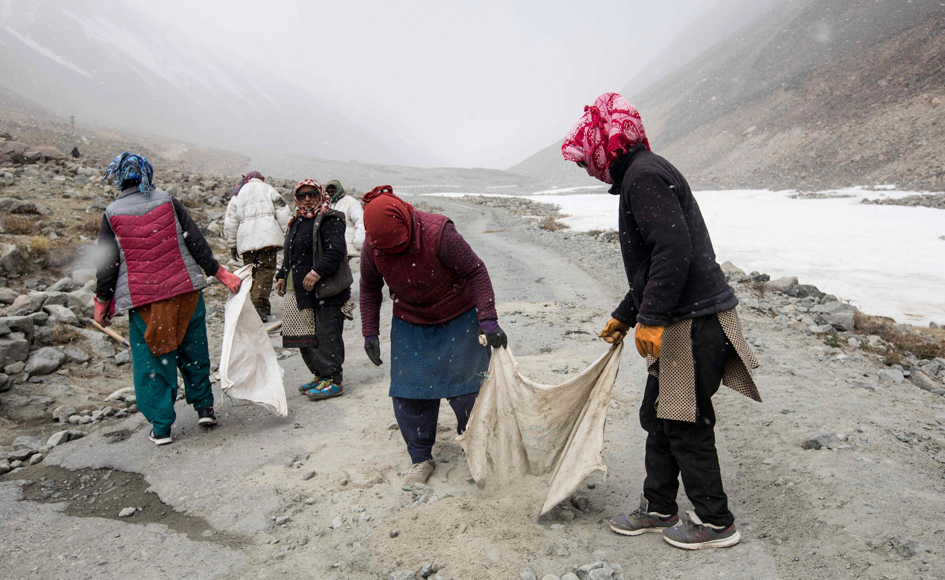 Local Ladakhi workers (foreground) along with road maintenance workers from Jharkhand state carry out maintenance road works during inclement weather along Pangong Lake road in northern India's Ladakh region. Photo: AFP
Local Ladakhi workers (foreground) along with road maintenance workers from Jharkhand state carry out maintenance road works during inclement weather along Pangong Lake road in northern India's Ladakh region. Photo: AFP
They toil six days a week, using only their bare hands, shovels and old sacks to move rocks and sand, with the help of local Ladakhi workers, some of them women.
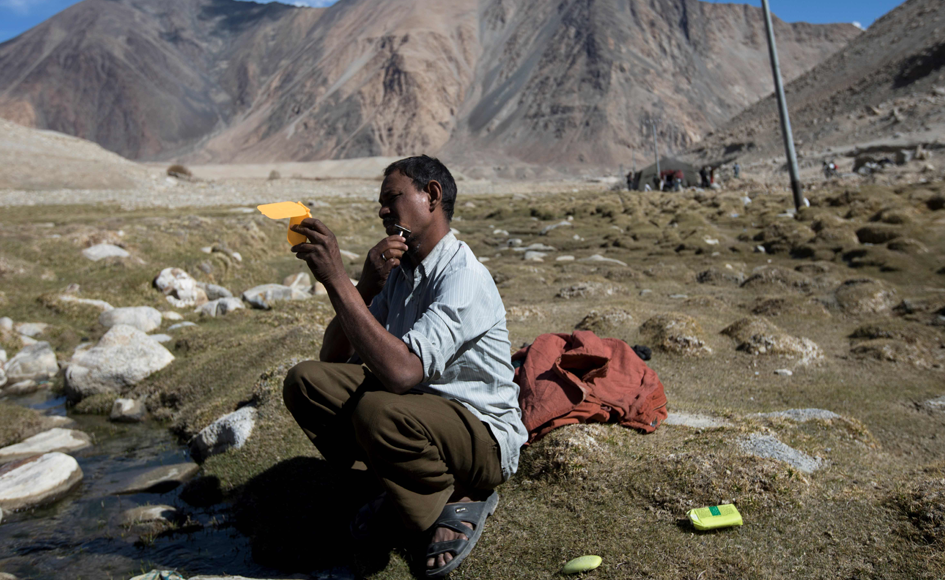 Raj Shekhar, 33, a road maintenance worker from India's low-lying eastern Jharkhand state, shaves on his day off at his campsite near Tangtse village in northern India's Ladakh region. Photo: AFP
Raj Shekhar, 33, a road maintenance worker from India's low-lying eastern Jharkhand state, shaves on his day off at his campsite near Tangtse village in northern India's Ladakh region. Photo: AFP
Sundays are the only days they can do their laundry as well as bathe and shave.
Each morning the group hops on a truck to reach the work site after a breakfast of tea and bread. They return to their basic housing tents after sunset and have a meal of rice and lentils.
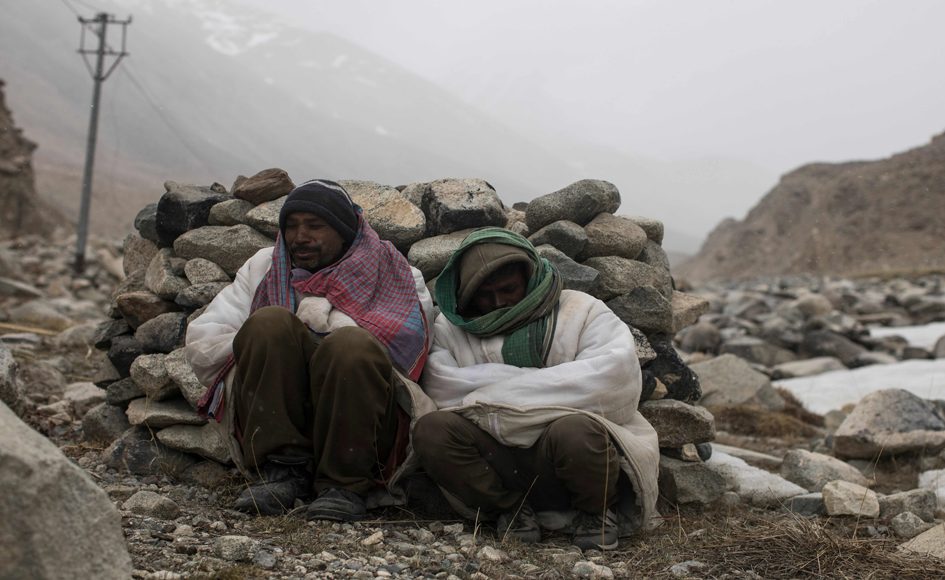 Raj Shekhar (L), 33, and Tej Narayan, 30, road maintenance workers from India's low-lying eastern Jharkhand state, take shelter behind rocks during inclement weather while working along Pangong Lake road near the Chang La pass in northern India's Ladakh region. Photo: AFP
Raj Shekhar (L), 33, and Tej Narayan, 30, road maintenance workers from India's low-lying eastern Jharkhand state, take shelter behind rocks during inclement weather while working along Pangong Lake road near the Chang La pass in northern India's Ladakh region. Photo: AFP
The tents do not have electricity and workers rely on kerosene stoves to cook and heat up the icy water. But they are undaunted.
"If given a chance I will come back here again," said Sushil Tutu, 35. "I like the road work.... I like it anywhere."
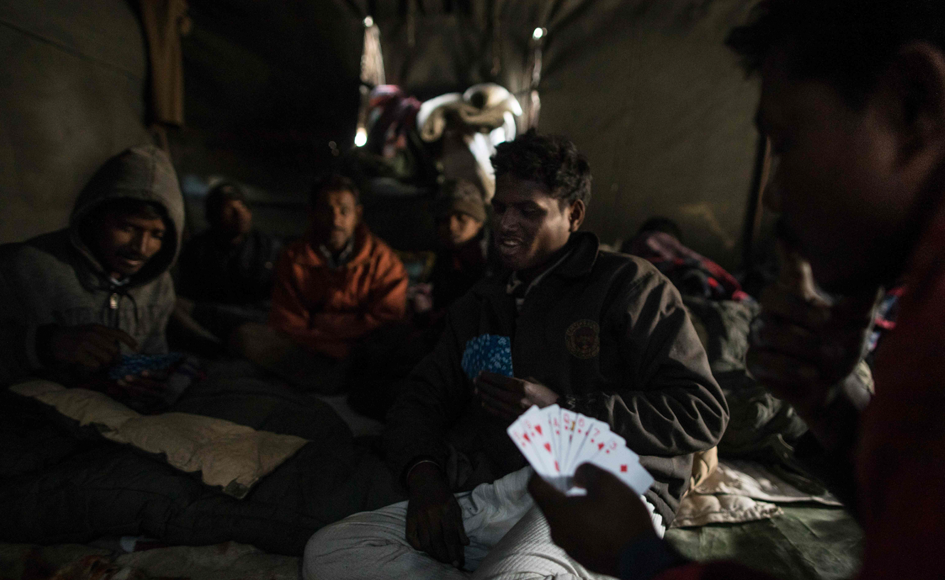 Workers from India's Jharkhand state play cards inside their tent following a day's work at their campsite near Tangtse village in northern India's Ladakh. Photo: AFP
Workers from India's Jharkhand state play cards inside their tent following a day's work at their campsite near Tangtse village in northern India's Ladakh. Photo: AFP
Another worker Rajshekhar, 33, said the inhospitable conditions helped him save more for the future.
"Back home we are unable to save money, we eat and drink and the money gets over. The work is good (here), I like the snow and the mountains. I don't like the cold though."
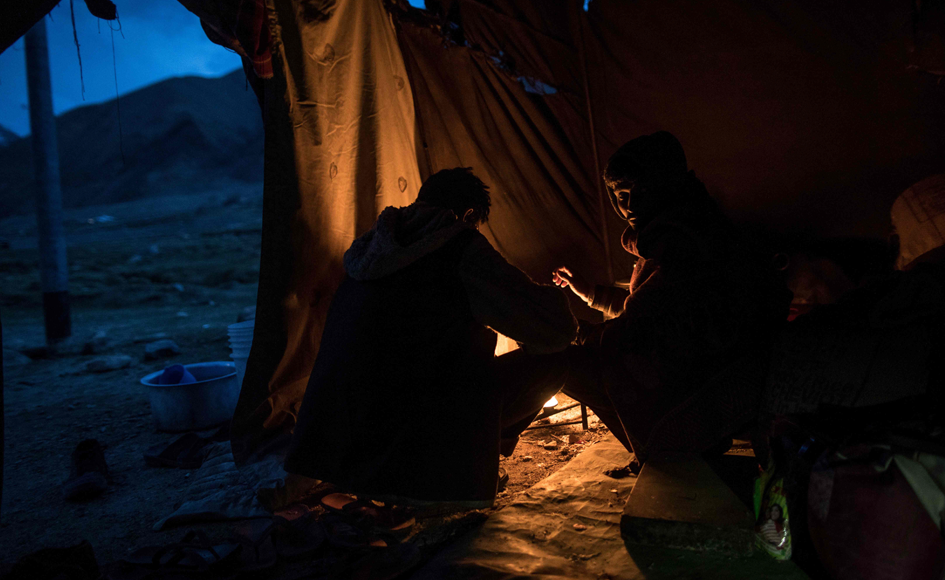 Santosh Mohali (R), 26, and Rai Bihari, 32, road maintenance workers from India's low-lying eastern Jharkhand state, warm up inside their tent following a day's work. Photo: AFP
Santosh Mohali (R), 26, and Rai Bihari, 32, road maintenance workers from India's low-lying eastern Jharkhand state, warm up inside their tent following a day's work. Photo: AFP
Migration for work is common in rural India. According to the non-government Aajeevika Bureau agency, millions work in hazardous conditions with little legal or social protection.
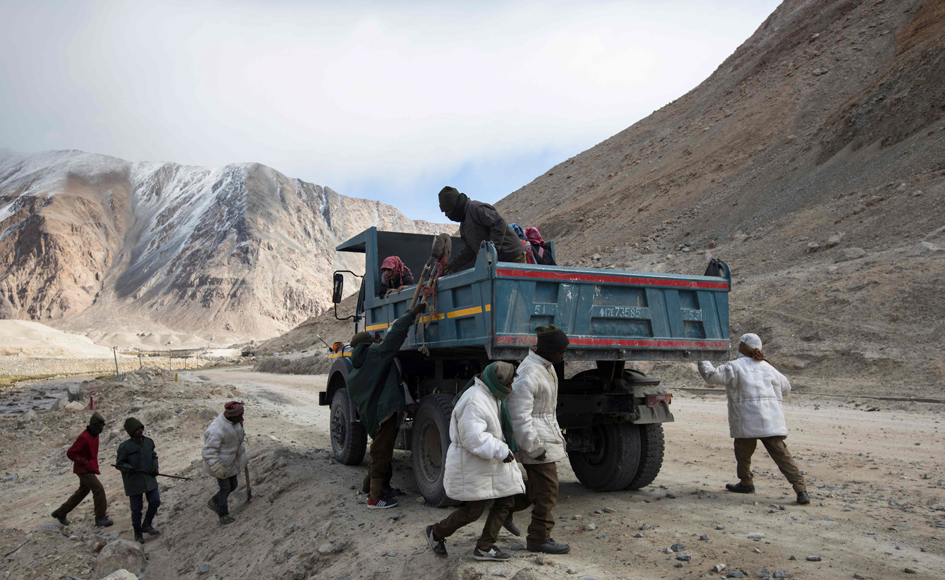 A group of labourers are toiling in a cold Indian Himalayan desert to repair some of the world's highest roads. Photo: AFP
A group of labourers are toiling in a cold Indian Himalayan desert to repair some of the world's highest roads. Photo: AFP
India's unemployment rate has been worsening. In 2017-2018 it was 6.1 percent, the worst since the 1970s, posing a major challenge for newly re-elected Prime Minister Narendra Modi.



















COMMENTS
Comments are moderated and generally will be posted if they are on-topic and not abusive.
For more information, please see our Comments FAQ